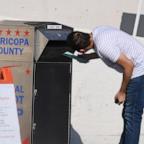TSA's 'behavior detection' leads to few arrests
WASHINGTON -- Fewer than 1% of airline passengers singled out at airports for suspicious behavior are arrested, Transportation Security Administration figures show, raising complaints that too many innocent people are stopped.
A TSA program launched in early 2006 that looks for terrorists using a controversial surveillance method has led to more than 160,000 people in airports receiving scrutiny, such as a pat-down search or a brief interview. That has resulted in 1,266 arrests, often on charges of carrying drugs or fake IDs, the TSA said.
The TSA program trains screeners to become "behavior detection officers" who patrol terminals and checkpoints looking for travelers who act oddly or appear to answer questions suspiciously.
Critics say the number of arrests is small and indicates the program is flawed.
"That's an awful lot of people being pulled aside and inconvenienced," said Carnegie Mellon scientist Stephen Fienberg, who studied the TSA program and other counterterrorism efforts. "I think it's a sham. We have no evidence it works."
TSA spokeswoman Ellen Howe said the program has been "incredibly effective" at catching criminals at airports. "It definitely gets at things that other layers of security might miss," Howe said.
In many cases, the extra scrutiny is a casual conversation with a TSA behavior officer that shows someone is innocent, Howe said. Studies are underway that analyze the program's effectiveness, she added.
The program has grown from 43 major airports last year to more than 150 airports, including some with just 20 flights a day. The number of behavior officers will jump from 2,470 to 3,400 by October.
The TSA has not publicly said if it has caught a terrorist through the program. The agency says that some who are arrested, particularly on fake ID charges, may be scouting an airport for a possible attack.
Some scientists say the TSA effort is just as likely to flag a nervous traveler as a terrorist.
"The use of these technologies for the purpose that the TSA is interested in moves into an area where we don't have proven science," said Robert Levenson, a psychologist at the University of California-Berkeley.




